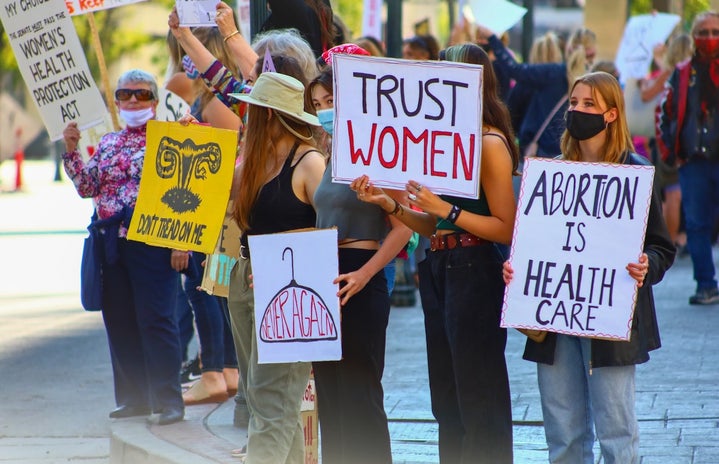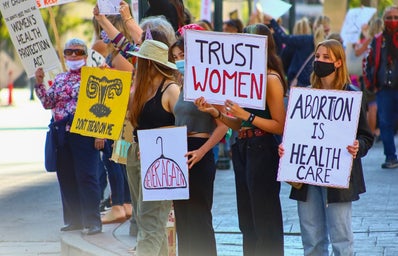I think most young women can remember where they were when Roe v. Wade was overturned. I for one was out to breakfast with my mom and younger sister. I remember sitting in shock as the full weight of the Dobbs decision sunk in. As someone who has lived a largely privileged life, this was my first experience with a political decision directly targeting me, and it was jarring. While I have never had to access emergency contraceptive care, I am very passionate about advocating for the importance of choice and access. Seeing that stripped away from so many women was in and of itself upsetting. I can recall sitting on my phone for the rest of the weekend and reading articles about all the other implications of the decision that were not strictly abortion access. These implications continue to expand beyond the express right to abortion. While they can be difficult to understand and contextualize, they shouldn’t have to be. Being aware of important issues like these is essential to being an informed voter and a person that can eloquently explain the situation to educate others, and an essential first step to making change.
Banning abortion continues to prove to be a slippery slope. Defining when life begins is something that has many repercussions on pregnant people, minority populations and even some of the most privileged in our society. Beyond not having the right to an abortion to terminate an unwanted pregnancy, this decision has led to many notable and dangerous situations in which people cannot obtain an abortion for wanted pregnancies in a medical setting. Many of these cases are widely known, ranging from women in Texas to Ohio not receiving necessary medical care due to new state laws and almost losing their lives as a result. When the government steps in to define when life begins, things get murky. The laws are difficult to interpret so on the side of caution, many physicians opt to not provide abortion care to women who desperately need it. Many government officials responsible for these laws argue that these cases are avoidable because they include an exception for when a woman’s life is in danger due to a medical condition. This statement alone is extremely vague, which makes it difficult for healthcare professionals, who are not experts in the law, to make quick decisions. This leaves many people who are experiencing miscarriages to come as close to death as possible to receive what used to be considered a routine procedure. It is clear that even if a woman wants to follow through with a pregnancy but unfortunately experiences a miscarriage, restricting abortion access makes it difficult to do so safely.
As much as it may seem like doctors are the ones at fault in situations like these, their hands are unfortunately tied by lawmakers, prohibiting them from providing care at the risk of losing their license. Many people who choose to make medicine their career do so not for the money or lavish lifestyle, but because they want to make a difference in their patients’ lives. While there are exceptions, most doctors genuinely want to help their patients and restricting care is not part of this desire. Healthcare professionals in states with strict abortion laws are faced with a massive ethical decision every time a patient comes to them in search of an abortion or for miscarriage care. They must choose between helping this one woman but never helping another patient again if their license is revoked or airing on the side of caution by following the laws as directed and keeping their license to continue helping patients for years to come. For many doctors, this is a decision that they decide to not face repeatedly. In states like Texas, Oklahoma and Tennessee, where abortion laws are strict, OB/GYNs are leaving their practices at significant rates to practice in other states. Additionally, in these states, residency programs for doctors still in training are not allowed to teach abortion care, making fewer students likely to study in these states. This creates a massive deficit of physicians for those seeking abortion/miscarriage care, but also for anyone who needs to access an OB/GYN. Overall, this makes accessing contraception, cancer screenings, care for chronic conditions and more less accessible for everyone in states with strict laws. It is not hard to see how far the ripple effects of abortion bans can reach, and this is not even the end.
As stated previously, banning abortion based on a definition of life has serious implications for anyone with a uterus who seeks to have some kind of control over their reproduction. Most notably, the ban restricts contraceptive use. Not only in the sense that abortion can be used as a form of birth control, but if lawmakers begin to deem fertilization as the moment when life begins, then IUD and Plan B would also be considered taking a life. It can also be taken one step further and argued that birth control, which can work in a variety of ways to prevent pregnancy, prevents life from existing and is therefore also illegal. The ability to access means of family planning and for women to take control over their livelihood is paramount to a functioning developed society. In fact, it is one of the most crucial factors in allowing a country to develop into a major economy. If women have the power to control when they reproduce, they have the power to control their timeline and are therefore permitted to have successful careers if they so choose. By defining the beginning of life and making birth control one big legal gray area, the country is putting women and the economy at risk.
While these restrictions do affect people with uteruses, they most significantly affect minority populations within that umbrella term. Specifically, African American and Latinx individuals continue to suffer the most because of these restrictions. Black women had the highest rates of recorded abortions in 2019, making up over a third of all individuals who had an abortion. Abortion is an extremely important right for women of color because of their history with the medical system and systemic racism. Due to a variety of causes which could constitute their own article, Black women receive far less education about contraception and are less likely to seek out medical care. Therefore, abortion is an essential tool for Black women to gain power and control over their lives if they were to fall pregnant unexpectedly. Pregnancy is no easy feat. Despite centuries of rhetoric suggesting the opposite, pregnancy takes a toll on individuals physically, mentally, socially and financially. Postpartum and then raising a child for 18 years come with their own set of massive challenges that should not be overlooked. For minority populations, these challenges are exacerbated by lower socioeconomic status and continued systemic racism in the medical system, government, house market and the list goes on. Raising a child is significantly harder for these groups, so forcing the decision upon them takes away a lot of their power as individuals. Not having the right to choose what happens with your body but with the rest of your life continues to perpetuate the idea that women and specifically minority women are less than their male counterparts. Restricting abortion access goes beyond just the procedure as it upholds centuries of sexism and racism.
Despite minority groups’ freedoms being the most targeted by these laws, we have recently seen how even the most affluent individuals are not safe from this ban. The Alabama Supreme court recently ruled that IVF is equivalent to murder in that all the embryos created during the process are considered citizens and deserve the same rights as you and me. This opens an entirely new can of worms. It raises questions like will couples be tried for murder if they currently have frozen embryos if they were created before the ruling? Will doctors and scientists responsible also be held for murder if they continue IVF? What kind of gap in healthcare will this create? Lawmakers often argue that they make these laws to protect children and to see more children be born. If this were the case, they would allow women and couples to pursue all avenues of creating a family, including IVF. Ultimately, this decision shows that these laws are not about children, but rather restricting freedom, especially that of minorities. Furthermore, this ruling affects not only heterosexual couples who hope to start a family, but cancer patients who froze their eggs or embryos to prevent them from being damaged by treatment, or young women who froze their eggs to focus on a career, or lesbian couples who use IVF as an avenue to start their own family. Unfortunately, it is likely that this ruling will not be the last in a rather short history thus far of restrictive laws.
The decision to overturn Roe v. Wade in 2022 was catastrophic. Upon first glance, many were upset about the loss of their right to abortion and rightfully so. However, upon closer examination and only one and a half years since the decision, we have already seen the massive and far-reaching effect of this decision. This decision affects essentially all facets of life for any person with a uterus. We must now be selective in where we live to avoid harsh laws, be mindful of career choices and family planning decisions, become hypervigilant about safe sex and so many other aspects of life that men will never have to face. If reading this makes you upset or worried for your future, take this as a sign to get involved in your community to create change. Most importantly, make informed voting decisions for national, state and local elections coming up this year. Continue to educate your peers and get involved in groups that spread awareness or help register people to vote. No effort is too small in working to protect the rights of everyone.


